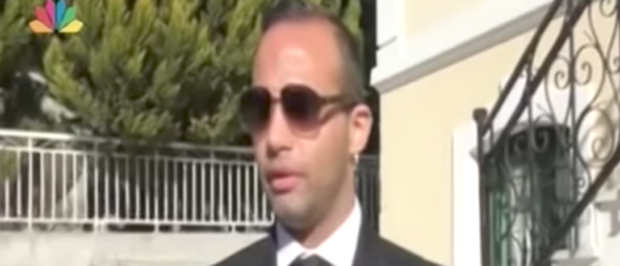The Trump campaign adviser who was revealed this week to have made numerous email requests seeking meetings between campaign and Russian government officials broached a similar idea in a March 31, 2016, meeting between Trump and his newly-formed foreign policy advisory team, The Daily Caller is told.
Two attendees at the meeting say that George Papadopoulos, a 30-something-year-old energy consultant, offered up the idea. But as with a half-dozen email inquires Papadopoulos sent to campaign officials pressing the same issue, the idea was rebuffed.
One attendee told TheDC that, as they recalled, then-Alabama Sen. Jeff Sessions, the chairman of the campaign’s national security advisory council, quashed Papadopoulos’ suggestion. A second attendee confirmed that it was Sessions who shut down Papadopoulos, a former researcher at the conservative Hudson Institute think tank. (RELATED: Why Was This Trump Campaign Adviser Trying To Set Up Meetings With Russians?)

Former Trump campaign adviser George Papadopoulos. (YouTube screen grab)
The cold response Papadopoulos received would seem to undercut the allegations that the Trump campaign colluded with or sought to maintain communications with the Russian government. Trump-Russia contacts are under investigation by three congressional committees and Special Counsel Robert Mueller. Sessions, the attorney general, has also come under scrutiny over several encounters he had during the campaign season with Russian ambassador Sergey Kislyak.
Those encounters, including a meeting in Sessions’ Senate office in September, were not revealed until after he was confirmed as attorney general.
Papadopoulos’ efforts raise questions about why the campaign volunteer was so eager to broker meetings between Moscow and Trumpworld.
Prior to joining the Trump effort, Papadopoulos, who is based in London, advised the Ben Carson presidential campaign. But Ying Ma, Carson’s deputy policy director, told TheDC that she does not recall Papadopoulos suggesting meetings with Russians during his time on that campaign, which ended last February.
Trump announced Papadopoulos and four others as his foreign policy team on March 21, 2016. Just three days later, Papadopoulos made his first attempt at setting up a meeting between Trump and Russian government officials.
As The Washington Post reported on Monday, Papadopoulos emailed Trump campaign officials on March 24, suggesting “a meeting between us and the Russian leadership to discuss US-Russia ties under President Trump.”
“Meeting with Russian Leadership — Including Putin,” was the subject line of the email.
Sam Clovis, the campaign’s chief policy adviser, shot down the idea.
“We thought we probably should not go forward with any meeting with the Russians until we have had occasion to sit with our NATO allies,” he told Papadopoulos.
Despite that pushback, Papadopoulos revisited the proposition in the formal foreign policy team meeting, which was held at the Old Post Office Pavilion in Washington, D.C.
Sessions opened the gathering by formally introducing Trump to his new foreign policy team. The real estate mogul said a few words and then went around the table to ask advisers for their thoughts and suggestions.
“When it got to George, he said something about meeting with Russians,” one attendee told TheDC.
“It was kind of strange, frankly, because he’s basically a young kid and he’s raising this issue. It just came and went and there was really nothing there.”
The attendee, who spoke on the condition of anonymity, recalled that Sessions dismissed Papadopoulos’ suggestion.
“Nope, not going there,” was what the attendee vaguely remembered Sessions saying.
A second attendee, who also spoke on the condition of anonymity, told TheDC that Papadopoulos was “definitely shut down” by Sessions.
The adviser also said that attendees agreed in the meeting not to revisit Papadopoulos’ suggestion.
Papadopoulos did not respond to repeated requestes for comment.
After the March 24 email and March 31 meeting, Papadopoulos would send at least five more emails pressing campaign officials to meet with Russian officials, including Putin. But Clovis, the chief policy adviser, and Paul Manafort, the campaign’s chairman, would again dismiss the proposals.
Not only does it appear that Papadopoulos’ pitches were unsolicited by the Trump campaign, it may also be the case that in at least one instance, he first contacted Russians, hoping they would meet with Trump.
Ivan Timofeev, the chairman of the Russian International Affairs Council (RIAC), a government-controlled diplomacy think tank, claimed earlier this week that Papadopoulos contacted him last spring inquiring about Trump or members of the campaign traveling to Moscow for a meeting.
Timofeev posted the claim on RIAC’s website in response to The Post article.
Timofeev said he asked Papadopoulos for an official letter of inquiry from the campaign as proof that the request to meet was serious. He said that Papadopoulos never provided such assurances.
Congressional investigators appear interested in Papadopoulos’ activities on the campaign. A former Trump campaign adviser who has been interviewed by congressional panels investigating the matter said that investigators asked numerous questions about Papadopoulos, a 2009 DePaul University graduate.
That source did not reveal what questions were asked about Papadopoulos. But his alleged connection to Sergei Millian, the chairman of the Russian-American Chamber of Commerce, will likely be of interest to investigators. Millian has been identified in news reports as “Source D,” the source of some of the most salacious claims made in the uncorroborated anti-Trump dossier compiled by former British spy Christopher Steele.
The Post reported earlier this year that Millian has told associates that he was in touch with Papadopoulos, raising the question of whether the pair discussed the campaign.
The White House did not respond to a request for comment, and a spokesperson for Sessions declined to comment.


